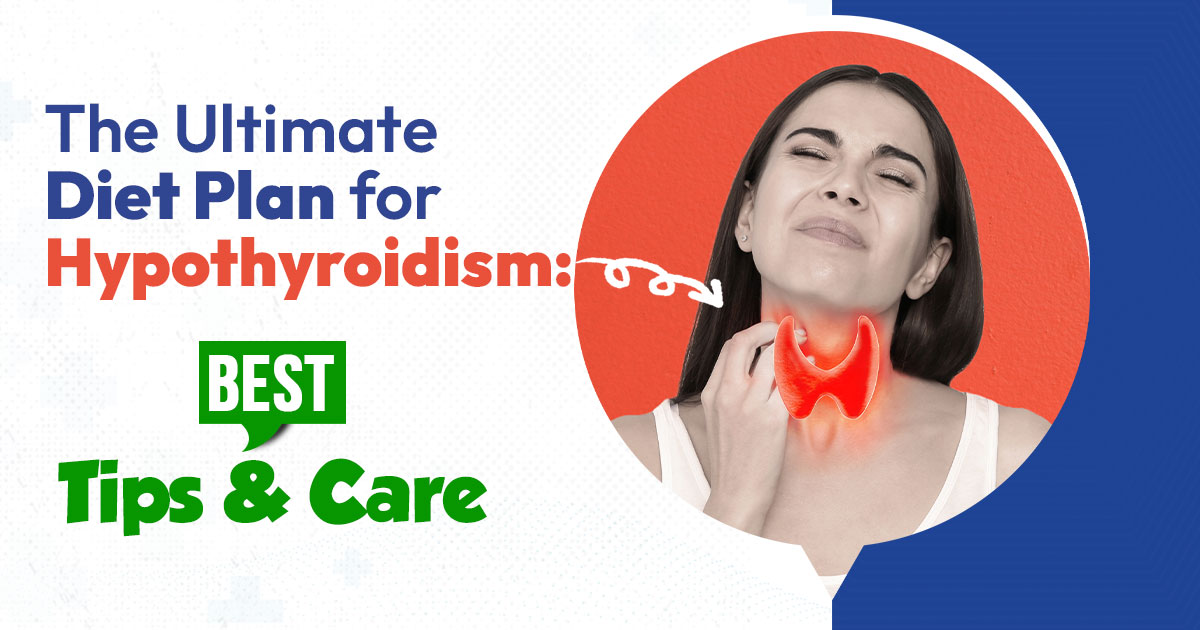Are you suffering from weight gain due to hypothyroidism? Hypothyroidism is believed to be a common health condition affecting men and women across the world. Based on a recent study, the prevalence of hypothyroidism is quite high, affecting more than 1 in 10 adults. Women of old age have been mostly affected due to the hypothyroidism. In Europe, the prevalence of overt and subclinical hypothyroidism has been more than 0.37% and 3.8%. Taking the best diet plan for hypothyroidism is helpful for simply resolving the issue and ensuring in reduction of its symptoms.
What Is Hypothyroidism?
Hypothyroidism is a condition that is caused due to an underactive thyroid, creating a variety of symptoms. These include weight gain, fatigue, joint and muscle pain, cold and many more. The thyroid is the butterfly-shaped gland that wraps across Windpipe and Trachea. Active Hormone Triiodothyronine (T3) and Inactive Hormone Tetraiodothyronine (T4) are the main hormones released by the thyroid. The thyroid produces as well as stores hormones, which regulate how the body uses energy. Normally, the Thyroid hormones help to easily regulate various functions in the body, such as:
- Metabolism
- Energy
- Digestion
- Temperature Regulation
- Mood
- Hair
- Skin
- Joint Health
Effect of Hypothyroidism on the Body:
Hypothyroidism could occur if the thyroid gland does not produce the required hormones, causing the body’s function to slow down. Hypothyroidism especially falls under the condition in which the thyroid gland does not produce the thyroid hormones. Common cause of hypothyroidism is the autoimmune condition Hashimoto’s disease. These would be causing the body’s immune system to attack these thyroid glands. These could be leading to damaging the gland which could be impairing thyroid hormone production. These could lead to severe symptoms such as iodine deficiency. Normally, symptoms of hypothyroidism are:
- Sensitivity to cold
- Weight gain
- Fatigue
- Weakness
- Depression
- Cold intolerance
- Hair loss
- Slowed speech
- Slowed heart rate
- Constipation
- Menstrual irregularities
- Impaired memory
Food Items That Can Help With Hypothyroidism
Hypothyroidism can be controlled by following a proper and healthy diet plan. Most people suffering from hypothyroidism do not have enough awareness about the thyroid diet plan and the food taken during the condition. Diet especially has a significant impact on hypothyroidism, and nutrients such as selenium and zinc improve thyroid function. Taking proper food items would easily slow down hypothyroidism in the body. Seeking a well-reputed nutritionist for getting a proper diet chart for hypothyroidism will be significant for getting good results. Some of the food items that can help with hypothyroidism listed below:
1. Foods Containing Iodine:
Taking food containing iodine is one of the best options for resolving the issue. Normally, the body requires iodine to produce the thyroid hormones. Our body cannot make iodine so it is essential to get it from their diets. Some of the foods that are rich in iodine are
- Cheese
- Milk
- Iodized Table Salt
- Seaweed
- Saltwater Fish
- Whole Eggs
Iodine deficiency could lead to hypothyroidism, which can enlarge the thyroid gland called Goiter. It is also quite important to avoid consuming too much iodine as it can worsen hypothyroidism.
2. Foods Containing Selenium:
Selenium is especially the micronutrient involved with the production of thyroid hormones as well as antioxidant activity. Normally, the Thyroid tissue is especially involved with varied aspects. Maintaining the selenium levels in the body helps to prevent thyroid disease along with easily promoting the overall health. Some of the foods that are rich in the selenium are:
- Brazil Nuts
- Turkey
- Beef
- Shrimp
- Tuna
- Eggs
- Ham
- Chicken
- Brown Rice
- Oatmeal
3. Foods Rich In Zinc:
Zinc is an amazing nutrient that specifically helps people with lower levels of thyroid hormones. Based on a recent study, zinc supplementation combined with selenium supplementation improves thyroid function in women the hypothyroidism. Some of the foods that are rich in zinc are
- Crab
- Fortified Cereals
- Pork
- Chicken
- Legumes
- Oysters
- Beef
- Pumpkin Seeds
- Yogurt
Adopting a healthy diet will be suitable for overall well-being. Based on research, following the best meal plan for hypothyroidism will be suitable for easily reducing the effect. Adapting to a well-balanced as well as thyroid-supportive diet will be suitable for alleviating the symptoms. These also involve contributing to the overall well-being.
4. Fruits And Vegetables:
Taking a well-balanced diet with a variety of fruits and vegetables is essential for reducing hypothyroidism in the body. These also ensure a good intake of Vitamins and Minerals. These foods are also involved in providing fiber, and these are beneficial for digestive health.
5. Lean Proteins:
Taking the Lean proteins is also essential for muscle maintenance. These are also significant options for concentrating on overall health, even without any hassle. Some of the foods rich in lean proteins are
- Poultry
- Fish
- Legumes
- Tofu
- Beans
5. Whole Grains:
Whole grains provide complex carbohydrates and fiber. These would extensively promote stable blood sugar levels. Some of the whole grains are:
- Brown Rice
- Oats
- Quinoa
- Whole Wheat
6. Dairy:
Taking a sufficient amount of calcium intake is helpful for promoting bone health. These are also easily achieved by adding dairy products and even fortified plant-based alternatives to the diet.
7. Omega-3 Fatty Acids:
Normally, foods that are rich in Omega-3 fatty acids, like fatty fish, are helpful for the body as they have anti-inflammatory properties. These also reduce the effect of Hypothyroidism in the body. Some of the foods rich in Omega-3 fatty acids are
- Flaxseeds
- Chia Seeds
- Walnuts
- Fatty Fish (salmon, mackerel, sardines)
What Is The Best Diet Plan For Hypothyroidism?
Managing hypothyroidism with a thoughtful and well-balanced diet is much easier. The hypothyroidism diet chart has been crafted with unique and customized aspects to provide practical guidance on making dietary choices. These are also suitable for helping to easily support thyroid health. The diet chart especially focuses on nutrient-dense foods along with mindful eating habits. Following the hypothyroidism diet plan aims to assist individuals in navigating through challenges associated with hypothyroidism.
Early Morning:
- 1 tbsp Coriander Seeds boiled in water + Soaked Nuts and slices of coconut
Breakfast:
- Moong Dal Chilla + Curd / Paneer Bhurji Sandwich / Oat meal / Onion kneaded
- Besan & Wheat Parantha with curd/ Poha with Sprouts
Mid Morning:
- Any seasonal Fruit/ Vegetable Juice
Lunch:
- Wheat & Bran Chapati + Carrot & Beans Vegetable + Curd + Salad
- Barley Pulao with lots of vegetables+ Curd + Salad
- Boiled Rice + Rajma or channa + Curd + Salad
- 3 egg white omelette topped with vegetables+ beetroot Raita
- Vegetable Oats Khichdi + Chaas + Salad
Evening:
- 1 cup Tea or Coffee (without sugar) or 1 cup Turmeric, Black pepper& Ginger Tea Along with snacking Makhana Bhel / Channa Chaat / Avocado Toast
Dinner :
- Vegetable Masala Khichdi + Salad
- Vegetable Dhalia with Dal + Salad
- Panner or Chicken Sautéed with Veggies
- Bran Roti + Dal Tadka + Salad Barnyard Millet Pulao + Salad
Before Bed:
- Chamomile Tea
Note: This is a sample hypothyroidism meal plan which is not customized according to the individual’s body composition & according to allergies or other medical concerns.
What Are Foods To Avoid In Hypothyroidism?
1. Soy and Soy Related Food Products:
Based on research, Soy and Soy related Food Products could be affecting the body to absorb thyroid medication properly. Soy-based food products have Goitrogens, which can cause thyroid gland irritation.
2. Cruciferous Vegetables:
Certain cruciferous vegetables that are higher in Goitrogens could be increasing hypothyroidism. Some of the Cruciferous Vegetables are
- Broccoli
- Spinach
- Cabbage
- Brussels sprouts
- Cauliflower
Please avoid taking these vegetables if you are suffering from thyroid problems
3. High Fiber Food:
Normally, Fibrous foods could cause more complications in hypothyroid patients. Taking a high-fiber diet can cause disturbance in the digestive system functions. Some of the High Fiber Food are:
- Green legumes
- Whole grains
- Beans
4. Processed Food:
Processed meals especially involves with unhealthy fats along high levels of salt. These could lead to more weight gain and even exacerbate hypothyroidism symptoms. You need to limit your consumption of processed foods to reduce the sugar level in the blood. Avoid taking the refined Carbohydrates.
5. Do Not Take Excessive Caffeine:
Normally, Excessive caffeine could be aggravating symptoms like heart palpitations and anxiety for patients suffering from thyroid issues. When you are caffeine-sensitive then you need to avoid taking until the thyroid level is normal.
6. Alcohol:
Consuming Excessive alcohol can affect the balanced thyroid hormone. These can also interfere with medication absorption. Minimizing alcohol consumption and consulting a healthcare expert is the best option.
Conclusion
A proper diet is essential to be maintained when you are suffering from hypothyroidism. Consulting the best dietician in Patiala, Punjab lets you get the finest thyroid diet plan/chart suitable for your health condition. Individualized medical care from the dietician guarantees accessibility and offers medical consultation services. Devoted dieticians are committed to offering a precise diagnosis. It also helps to easily know about the course of action along with insightful healthcare advice. Dependable and easily available diet chart helps to simply take charge of your health right now.
Also check our other diet plans:



